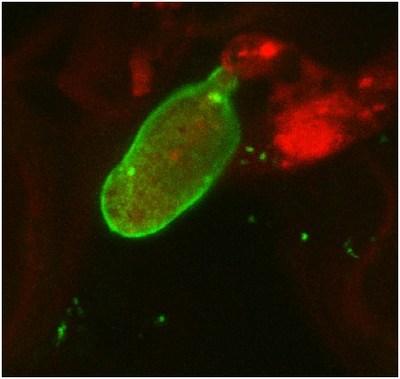IBBR Researchers Awarded $850K from NSF to Study How Plants Defend Against Fungal Invasion

ROCKVILLE, Md., Feb. 25, 2020 /PRNewswire/ — Researchers at the Institute for Bioscience and Biotechnology Research (IBBR) recently received $850K from the National Science Foundation (NSF) to advance our understanding of how fungi like powdery mildew infect plants including food source crops, and how plants fight back. IBBR Fellow Dr. Shunyuan Xiao (Professor, Department of Plant Sciences and Landscape Architecture, University of Maryland College of Agriculture & Natural Resources) is the principal investigator on the award.

Some fungi and organisms called oomycetes grow by absorbing nutrients from a host plant. They penetrate their host using a root-like structure called a haustorium. The ability of these pathogens to infect crops depends entirely on the proper function and performance of their haustoria.
“On a global scale, up to 15% of crops are lost to fungal pathogens each year,” Xiao explains. “The molecular warfare between plant and invader occurs where the invader’s haustorium contacts the plant cell. The winner determines resistance or susceptibility to an invading pathogen.” Despite the importance to crop production, we have a poor understanding of what makes up the haustorium and how it functions.
Xiao’s lab is pioneering research that is geared towards better understanding the haustorium. With support from the NSF, his group plans to identify and study proteins located at the host-pathogen interface (i.e. the battleground) where the haustorium contacts the host plant, using a system consisting of the model plant Arabidopsis and a powdery mildew named Gc-UCSC1. One known factor Xiao’s lab identified is a plant resistance protein named RPW8.2, which Xiao describes as a “missile-like defense mechanism evolved in plants to fight haustorium-based invasion.”
In collaboration with Dr. Ning Zheng, from the University of Washington, Xiao’s group will work to solve the structure of RPW8.2 to further understand how it works. The Xiao lab will also use RPW8.2 as a unique tool to identify new factors from the host plant and/or the pathogen that may make a host more or less susceptible to infection. The project’s goal is to enable more effective control measures of fungal diseases of crop plants.
“New findings from this project may translate to novel strategies to fight against fungal pathogens and reduce crop losses, thereby contributing to sustainable agriculture and global food security,” says IBBR Director, Thomas Fuerst.
Initial funding for Dr. Xiao’s research was provided through a seed grant from the University of Maryland Strategic Partnership: MPowering the State, a program designed to leverage the strengths and missions of the University of Maryland, College Park and the University of Maryland, Baltimore.
IBBR is a joint research enterprise of the University of Maryland, College Park, the University of Maryland, Baltimore, and the National Institute of Standards and Technology. IBBR is also financially supported in part by the University of Maryland Strategic Partnership: MPowering the State, an initiative designed to achieve innovation and impact through collaboration. The Institute sits at the nexus of academic research and commercial application, bringing together critical elements necessary to inspire transformative discoveries in the field of biotechnology that provide innovative solutions to major scientific and engineering challenges important to society. IBBR researchers seek to advance the fields of disease pathways and biomolecular targets, biomolecular measurement sciences, and biomolecular engineering, including structure-based design of vaccines and therapeutics. The Institute also serves to expand the economic base of science and technology in the State of Maryland. For more information, visit https://www.ibbr.umd.edu/.
For more information and collaborative opportunities at IBBR, contact:
Viqar Aslam
Director, Business Development and Strategy
Institute for Bioscience and Biotechnology Research
University of Maryland
9600 Gudelsky Drive | Rockville, MD | 20850
vaslam@umd.edu | 240.314.6373

View original content to download multimedia:http://www.prnewswire.com/news-releases/ibbr-researchers-awarded-850k-from-nsf-to-study-how-plants-defend-against-fungal-invasion-301010956.html
SOURCE Institute for Bioscience and Biotechnology Research
